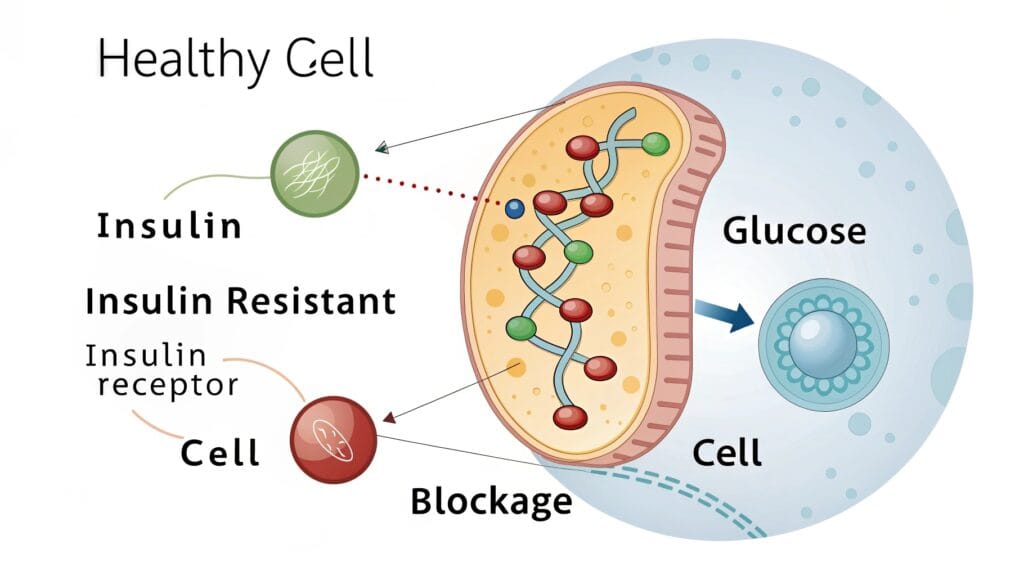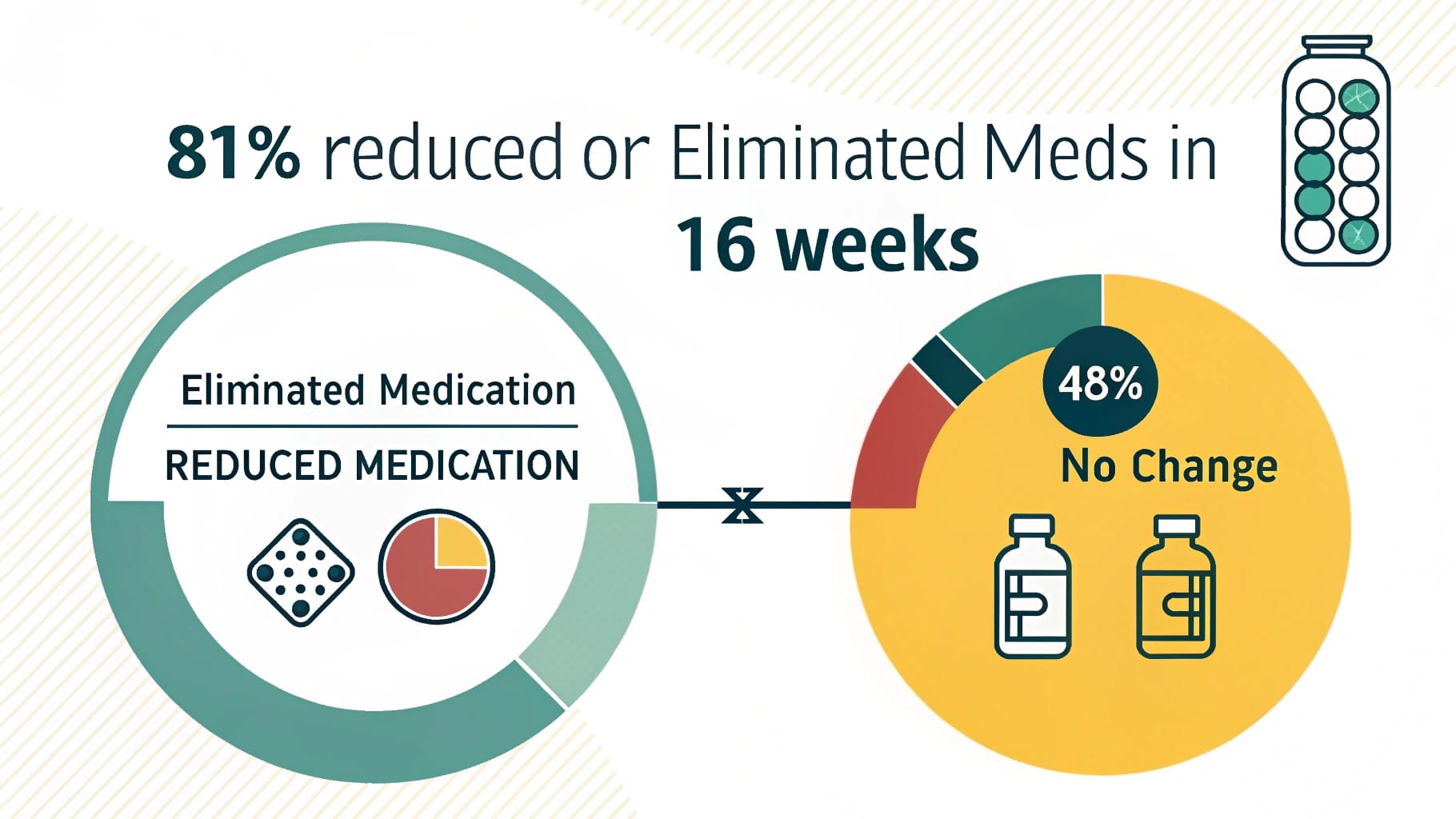Can a Keto or Carnivore Diet reverse type 2 diabetes? Science Says YES
Living with Type 2 diabetes means constantly monitoring blood sugar, managing medications, and worrying about long-term complications. For many, it feels like a one-way street with an increasing medication burden over time. But what if there was another path?
What if a specific way of eating could help you not just manage, but potentially reverse Type 2 diabetes and reduce or even eliminate your need for medication? It’s not just anecdotal – groundbreaking research suggests it’s possible.
In this article, we’ll explore compelling scientific evidence showing how low-carb ketogenic diets can dramatically improve health markers for people with Type 2 diabetes, potentially leading to significant reductions in medication. We’ll also connect these findings to the carnivore diet approach and what it might mean for your health journey.
The Challenge of Type 2 Diabetes
Type 2 diabetes fundamentally revolves around insulin resistance – when your body’s cells stop responding properly to insulin, leading to chronically elevated blood sugar levels. According to the Centers for Disease Control and Prevention, more than 37 million Americans have diabetes (about 1 in 10), and approximately 90-95% of them have Type 2 diabetes. The standard medical approach typically involves managing symptoms through medications like Metformin, sulfonylureas, or injectable treatments like Ozempic, often with dosages increasing over time.
For many living with this condition, the side effects, costs, and psychological burden of these medications create a strong desire to find more effective solutions or reduce reliance on pharmaceuticals altogether.
Table of Contents
Scientific Breakthrough: A Study on Low-Carb Keto & Type 2 Diabetes
Promising research published in a peer-reviewed medical journal (indexed on PubMed, PMID: 16644701) has shown remarkable results when Type 2 diabetics adopt a low-carbohydrate ketogenic diet.
Study Design
- Participants: Obese patients diagnosed with Type 2 diabetes
- Diet Protocol: Low-Carbohydrate Ketogenic Diet (LCKD) restricting carbohydrates to less than 20g per day
- Duration: 16 weeks of dietary intervention
- Key Factor: No mandatory calorie restriction – participants focused solely on carbohydrate limitation
The Remarkable Results
The findings from this research were nothing short of transformative:
- Significant Weight Loss: Participants lost an average of 10.1 kg (approximately 22 pounds) – without strict calorie counting!
- Dramatic Blood Sugar Control Improvement:
- Average HbA1c dropped from 7.3% to 6.6% (moving from diabetic range toward non-diabetic levels)
- 24% of patients achieved HbA1c below 6.0% (often considered within non-diabetic or pre-diabetic range)
- Average 44% reduction in fasting glucose levels
- Profound Impact on Medication:
- 33% (7 out of 21 patients) eliminated ALL their diabetes medications
- 48% (10 out of 21 patients) reduced the number or dosage of medications
- In total, 81% of patients either reduced or completely eliminated their diabetes medication!
- Improved Lipid Markers: Better triglyceride levels and increased HDL (“good” cholesterol)
These results challenge the conventional wisdom that Type 2 diabetes is a progressive, irreversible condition requiring escalating medication. Instead, they suggest that dietary intervention targeting carbohydrate restriction can significantly improve metabolic health and potentially reduce the need for pharmaceutical management.

Why Did It Work? The Science Behind Low Carb & Insulin Resistance
To understand why low-carb approaches like the ketogenic diet show such promise for type 2 diabetes management, we need to examine the underlying mechanisms of insulin resistance and how carbohydrate restriction addresses them. According to research published in the Journal of Diabetes Science and Technology, carbohydrate restriction directly targets the pathophysiology of Type 2 diabetes.
Breaking the Cycle of Hyperinsulinemia
Insulin resistance develops in two primary ways:
- Fast Insulin Resistance: Constantly high insulin levels from frequent carbohydrate-heavy meals lead to cells becoming less responsive to insulin signals. By drastically cutting carbs (like the study’s approach of <20g/day), you reduce blood sugar spikes and therefore the need for insulin production.
- Slow Insulin Resistance: Over time, enlarged and stressed fat cells contribute to systemic inflammation and metabolic dysfunction. Weight loss (as seen in the study) and lower insulin signals help shrink these cells, improving their function and reducing inflammatory responses that interfere with insulin signaling.
The Metabolic Reset Effect
When you drastically reduce carbohydrate intake, several beneficial changes occur:
- Blood glucose levels stabilize without constant spikes and crashes
- Insulin levels decrease, giving cells a chance to regain sensitivity
- The body shifts from primarily burning glucose to efficiently using fat for fuel
- Inflammation decreases throughout the body, further improving cellular insulin response
- Liver function improves, enhancing its role in blood sugar regulation
These mechanisms work together to address the root causes of Type 2 diabetes rather than just managing symptoms, explaining why the study participants experienced such significant improvements in their condition.
From Keto Study to Carnivore Diet: Connecting the Dots
While the groundbreaking study focused specifically on a low-carbohydrate ketogenic diet, these findings have important implications for understanding the potential benefits of a carnivore diet for Type 2 diabetes management.
The carnivore diet represents an even more restrictive approach to carbohydrate elimination, typically providing near-zero carbohydrate intake by focusing exclusively on animal products. All the mechanisms that made the ketogenic diet effective in the study – drastic carbohydrate reduction, lowered insulin demand, improved metabolic markers – are potentially even more pronounced with the carnivore approach. A case report published in Frontiers in Endocrinology documented remission of Type 2 diabetes in a patient following a carnivore diet.
Additionally, the carnivore diet may offer additional benefits for some individuals with Type 2 diabetes:
- Complete elimination of plant compounds that might contribute to inflammation in sensitive individuals
- Simplified meal planning that may improve dietary adherence
- Higher protein intake that can support muscle preservation during weight loss
- Elimination of processed foods that might otherwise trigger cravings or blood sugar fluctuations
While specific large-scale studies on the carnivore diet for Type 2 diabetes are still emerging, the scientific principles demonstrated in the LCKD research strongly support its potential effectiveness. This aligns with numerous anecdotal reports from individuals who have experienced significant improvements in blood sugar control, weight management, and medication reduction on meat-based diets.

What This Means For You: Potential Benefits & Action Steps
Based on the scientific evidence and understanding of metabolic mechanisms, adopting a low-carb approach like keto or carnivore could potentially offer several life-changing benefits for those with Type 2 diabetes:
- Improved blood sugar control with lower and more stable HbA1c levels
- Significant weight loss without calorie counting
- Increased energy levels and reduced fatigue
- Potential reduction or elimination of diabetes medications
- Better overall metabolic health markers
- Decreased risk of diabetes-related complications over time
MEDICAL DISCLAIMER
THIS INFORMATION IS FOR EDUCATIONAL PURPOSES ONLY.
NEVER make changes to your diabetes medication without strict supervision from your doctor or healthcare provider.
Medications, especially insulin, may need immediate adjustment as blood sugar improves rapidly on low-carb diets to avoid dangerous hypoglycemic episodes.
Always discuss your dietary plans with your medical team before making significant changes.
The American Diabetes Association’s 2023 Standards of Care recognizes that low-carbohydrate eating patterns may be appropriate for some people with diabetes and advises medical supervision when implementing significant dietary changes.
Addressing Common Questions
How Long Does it Take to See Results with Low-Carb Diets for Type 2 Diabetes?
While the study we examined showed significant results after 16 weeks, many people report noticeable improvements in blood sugar levels within days or weeks of beginning a low-carb approach. Initial water weight loss and blood sugar stabilization often happen quickly, while deeper metabolic healing and potential medication reductions typically require more time and consistency. Working with healthcare providers who can monitor your progress and adjust medications accordingly is essential.
Do I Need to Count Calories on Keto or Carnivore Diets to Reverse Type 2 Diabetes?
One of the most interesting aspects of the research is that participants achieved significant weight loss and health improvements without mandatory calorie restriction. Instead, the focus was on carbohydrate limitation (under 20g daily). Many people find that protein and fat are naturally satiating, leading to spontaneous calorie reduction without hunger or explicit counting. The carnivore approach may simplify this further by eliminating all plant foods.
What About Medications Like Metformin or Ozempic While Following These Diets?
Low-carb diets like keto or carnivore can potentially reduce the need for diabetes medications such as Metformin or Ozempic, as demonstrated by the 81% of study participants who reduced or eliminated medications. However, this process must be carefully managed by healthcare providers. Blood sugar can improve rapidly on these diets, potentially requiring quick medication adjustments to prevent hypoglycemia. Never adjust or stop medications without proper medical supervision. The National Institute of Diabetes and Digestive and Kidney Diseases provides detailed information about different diabetes medications and how they work, which can help you have an informed conversation with your healthcare provider.
Is a Low-Carb or Carnivore Approach Safe for Managing Type 2 Diabetes?
When implemented with proper medical oversight, low-carb and carnivore diets can be safe and effective approaches for many people with Type 2 diabetes. The greatest safety concern involves monitoring and adjusting medications appropriately as blood sugar levels improve. Additionally, some individuals may need to monitor other health markers and possibly supplement with electrolytes, particularly during the transition period. Working with healthcare providers familiar with low-carb approaches is ideal for safety and optimal results.
Conclusion: Hope and a Path Forward
The scientific evidence is increasingly clear: dietary intervention through carbohydrate restriction offers genuine hope for those living with Type 2 diabetes. A systematic review published in the BMJ concluded that low-carbohydrate diets show promise for managing Type 2 diabetes and potentially achieving remission. The remarkable study results showing 81% of participants reducing or eliminating medications highlight the powerful potential of approaches like the ketogenic and carnivore diets.
Rather than merely managing symptoms with increasing medication, these dietary approaches address the root metabolic causes of Type 2 diabetes, potentially putting the condition into remission for many individuals. While not everyone will experience complete reversal, the improvements in health markers, weight management, and quality of life can be substantial.
As with any significant health change, the key is working with knowledgeable healthcare providers, starting with a solid understanding of the science, and making informed choices about your health journey. The path toward reclaiming your metabolic health may be challenging at times, but the potential benefits make it well worth exploring.
Share Your Experience
Have you tried using keto or carnivore approaches to manage Type 2 diabetes? We’d love to hear about your experiences in the comments below! Whether you’ve seen improvements in blood sugar, reduced medications, or encountered challenges along the way, your story could provide valuable insights for others on a similar journey.
For more information on carnivore and keto approaches to health, check out these related articles:
- What Breaks Intermittent Fasting
- Intermittent Fasting on Keto and Carnivore
- Complete Carnivore Diet Food List
- Carnivore Diet Meal Ideas
- Zero Carb Snacks for Keto and Carnivore
Enjoy, Review – We Value Your Opinion!
There are no reviews yet. Be the first one to write one.

